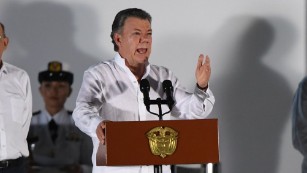
Colombian leaders scrambled Monday to rework a peace deal between the government and FARC rebels, despite the voters’ rejection of the agreement in a Sunday referendum.
FARC Commander Timoleón “Timochenko” Jiménez said Monday that his group would maintain the ceasefire with Colombia’s government that was put into effect last June.
Timochenko said FARC would follow the peace deal that was signed last week between him and Colombian President Juan Manuel Santos.
“The FARC-EP remains faithful to the agreement,” he said In a televised statement on Colombia’s state-run TV. “Peace with dignity is here to stay.”
Santos also said the government would respect the ceasefire and that negotiations would continue in Havana, Cuba.
Colombia’s political representatives — including Congress leaders, Senate leaders, party leaders and government negotiators — met Monday in Bogota with Santos. Former Colombian President Álvaro Uribe, who had been leading the campaign against the referendum, did not attend.
But there was no indication of what came out of the Monday meeting.
Colombia was thrown into confusion after voters narrowly rejected a referendum on the deal brokered between the government and FARC, a Marxist rebel group. Final results showed a little more than 50% voted no.
What happens next in Colombia?
The rejection was a shock because the agreement had taken more than four years to negotiate and would have ended five decades of war that left an estimated 220,000 people dead.
Also on Monday, United Nations Secretary General Ban Ki-Moon said he would send his special envoy, Jean Arnault, to Havana for talks on the peace agreement. He said he was encouraged that both sides appeared to want to end armed conflict.
“After more than five decades of war, the Colombian people deserve no less,” he said through a spokesperson.
US State Department spokesman John Kirby commended the peaceful election and said “difficult decisions are going to have to be taken in the days ahead.” He said the United States supports Santos’ efforts for a broad dialogue.
The referendum appeared to fail because Colombians thought the deal didn’t do enough to punish the FARC rebels.
FARC had seized territory, attacked government forces and conducted high-profile kidnappings. The rebels also hijacked planes, made millions trafficking cocaine and forced children to fight.
As reported by CNN
